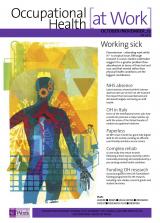October/November 2013 (vol. 10/3)
ContentsFeaturesNewsLegal
NewsResearch DigestResearch PlusCPD
Research Plus
Organisational justice improves attendance
A study of 29,180 workers in 2,640 public sector workplaces in Finland (76% female, 21% manual workers) found a clear link between perceived low ‘organisational justice’ (fairness at work) and sickness absence of more than nine days’ duration (as recorded in social insurance registers). Two components of organisational justice – procedural (perceived fairness of the procedures by which decisions are made) and interactional (treatment of employees and communication by management) – as well as job strain were measured using standard self-report scales. During the one-year follow-up, 855 participants (4%) had an absence of more than nine days due to a mental disorder. Those with a higher perception of either procedural or interactional justice had, respectively, a 27% (OR = 0.73) and 24% (OR = 0.76) lower risk of sickness absence due to any mental health disorder (95% CIs 0.66–0.81 and 0.70–0.83) and this remained significant after adjustment for potential confounders, including job strain. Self-perceived procedural and interactional justice were also significantly associated with lower sickness absence specifically from both depressive and anxiety disorders. There was only weak evidence that mental health disorders were associated with baseline perceived procedural but not interactional justice; in other words, little evidence for reverse causality.
Occupational Health at Work October/November 2013 (vol. 10/3) pp40



